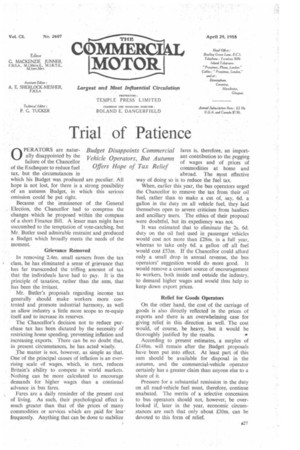Trial of Patience
Page 29

If you've noticed an error in this article please click here to report it so we can fix it.
OPERATORS are naturally disappointedby the failure of the Chancellor of the Exchequer to reduce fuel tax, but the circumstances in which his Budget was produced are peculiar. All hope is not lost, for there is a strong possibility of an autumn Budget, in which this serious omission could be put right.
Because of the imminence of the General Election, the Chancellor had to compress the changes which he proposed within the compass of a short Finance Bill. A lesser man might have succumbed to the temptation of vote-catching, but Mr. Butler used admirable restraint and produced a Budget which broadly meets the needs of the moment.
Grievance Removed In removing 2.4m, small earners from the tax • class, he has eliminated a sense of grievance that has far transcended the trifling amount of tax that the individuals have had to pay. It is the principle of taxation, rather than the sum, that has been the irritant.
Mr. Butler's proposals regarding income tax generally should make workers more• contented and promote industrial harmony, as well as allow industry a little more scope to re-equip itwlf and to increase its reserves.
The Chancellor's decision not to reduce purchase tax has been dictated by the necessity of restricting home spending, preventing inflation and increasing exports. There can be no doubt that, in present circumstances, he has acted wisely.
The matter is not, however, as simple as that. One of the principal causes of inflation is an everrising scale of wages, which, in turn, reduces Britain's ability to compete in wbrld markets. Nothing can be more calculated to encourage demands for higher wages than a continual advance in bus fares.
Fares are a daily reminder of the present cost of living. As such, their psychological effect is much greater than that of the prices of many commodities or services which are paid for less frequently. Anything that can be done to stabilize fares is, therefore, an important contribution to the pegging of wages and of prices of commodities at home and abroad. The most effective way of doing so is to reduce the fuel tax.
When, earlier this year, the bus operators urged the Chancellor to remove the tax from their oil fuel, rather than to make a cut of, say, 6d. a gallon in the duty on all vehicle fuel, they laid themselves open to severe criticism from hauliers and ancillary users. The ethics of their proposal were doubtful, but its expediency was not.
It was estimated that to eliminate the 2s. 6d. duty on the oil fuel used in passenger vehicles would cost not more than £28m. in a full year, whereas to take only 6d. a gallon off all fuel would cost £53m. If the Chancellor could afford only a small drop in annual revenue, the bus operators' suggestion would do more good. It would remove a constant source of encouragement to workers, both inside and outside the industry, to demand higher wages and would thus help to keep down export prices.
Relief for Goods Operators On the other hand, the cost of the carriage of goods is also directly reflected in the prices of exports and there is an overwhelming case for giving relief in this direction as well. The cost would, of course, be heavy, but it would be thoroughly justified by the results. • According to present estimates, a surplus of £148m. will remain after the Budget proposals have been put into effect. At least part of this sum should be available for disposal in the autumn, and the commercial-vehicle operator certainly has a greater claim than anyone else to a share of it.
Pressure for a substantial remission in the duty on all road-vehicle fuel must, therefore, continue unabated. The merits of a selective concession to bus operators should not, however, be overlooked if, later in the year, economic circum . .stances are such that only about £30m. can be devoted to this form of relief.




































































































